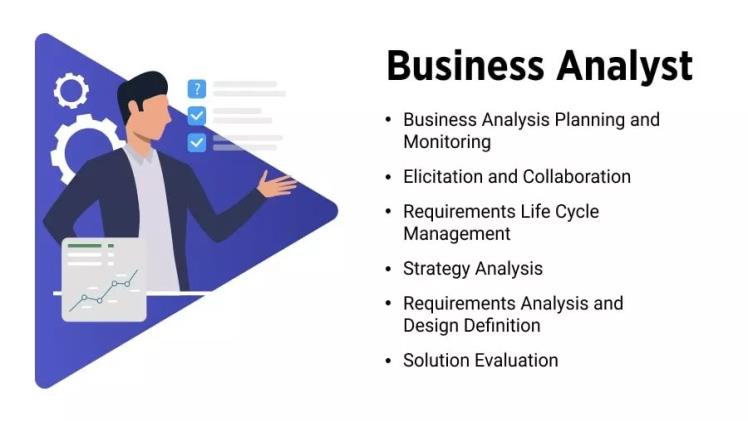Did you know that last year observed a massive 800% increase in the number of Business Analyst jobs in the US alone?
According to the BA Times article, there is a huge demand for business analysts across the world as they play a significant role in shaping the future of the business world in the future.
Business Analysts have always proved to increase the efficiency of an organization and improve their productivity as well as ROI.
This is why they are crucial to every business and are greatly paid. In India, the average annual salary of a Business Analyst, according to Glassdoor, is INR 7,00,000 and may go as high as INR 1,473,000.
This has resulted in a surge in the number of professionals looking for online resources to acquire the required skills and qualifications. Let’s discuss this role in brief.
Who is a Business Analyst?
What does this image depict?
So, a business analyst is the one who helps his/her organization to improve processes, services, products, and software via data analysis.
A Business Analyst bridges the gap between the IT team and business to improve the efficiency of the business. Business analysts are often referred to as ‘agents of change’ as they symbolize bringing about changes.
Wikipedia defines a Business Analyst as ‘a person who analyzes and documents the market environment, processes, or systems of businesses. They help businesses improve their processes, products, services, and software through data analysis and software.’
Typically, as a BA (Business Analyst), you engage with users and business leaders to understand the ways data-driven changes to products, services, processes, and hardware can improve the efficiency of the business and add value. Then you have to find solutions to articulate those ideas along with balancing them with what is feasible both technically and financially. Also, it should be functionally reasonable. On the basis of your role, you may also be required to work with datasets to bring about improvements in hardware, software, tools, products, services, or processes.
According to the International Institute of Business Analysis or IIBA, ‘Business Analysis involves understanding how organizations function to accomplish their purposes and defining the capabilities an organization requires to provide products and services to external stakeholders.’
IIBA also considers BAs as agents of change and describes business analysis as a process for introducing and monitoring changes to an organization, be it a government agency, profit-business, or a non-profit one.
Cut short, a business analyst identifies problems and opportunities within an organization and finally defines solutions that help in achieving business goals. A business analyst’s job role covers interacting with IT and financial reporting teams to develop strategies and initiatives that enhance internal and external reporting while optimizing costs.
Business Analyst Job Description
A Business Analyst is accountable for building new models to support business decisions. This is accomplished by conducting market analyses, analyzing product lines and the profitability of a business as a whole. Also, you have to build and monitor data quality metrics and make sure that the business data and reporting requirements are met.
A typical job description of a business analyst is mentioned below:
- Work in collaboration with project managers
- Create a detailed business analysis, outline problems, opportunities and define strategies and solutions for those business problems.
- Budget and forecast
- Plan and monitor
- Variance analysis
- Pricing
- Creating reports
- Define business requirements and report them back to stakeholders.
On the top of the list of responsibilities of a business analyst comes the identification and prioritization of functional and technical requirements. Then you can use those requirements to set IT on board and understand what the client actually wants, which is one of the biggest duties of a Business Analyst. You have to work as if you are a business owner, even though your organization is the product owner.
As companies today rely more on data to make business decisions, the role of a business analyst is evolving consistently. The business problems vary from company to company, and you may be required to address different problems such as changing technologies, outdated legacy systems, broken processes, siloed organizations, and poor customer satisfaction.
When solutions are implemented, you have to ensure that the business goals are met with all the technical tasks that are carried out. You have to be involved in system testing and creating user manuals.
Business Analyst: Required Skills
To become a successful business analyst, you have to acquire a perfect blend of hard skills and soft skills. You need to know how to fetch, analyze, and report data trends and share that information with team members and other concerned professionals to apply it on the business side.
Some of the BAs are IT experts and low in business acumen; they can transition their careers by acquiring those skills.
Some of the crucial skills listed by IIBA are:
- Verbal and written communication skills
- Consultative and interpersonal skills
- Analytical thinking and problem-solving skills
- Organization skills
- Stakeholder analysis
- Knowledge of the business structure
- Facilitation skills
- Cost-benefit skills
- Requirements engineering
- Processes modeling
- Being capable of delivering top-level accuracy by going detail-oriented
- Understanding databases, networks, and related technologies
Salary of a Business Analyst
According to PayScale, the median annual salary of an IT Business Analyst is nearly USD 67,762. For similar job titles that are considered as BAs, the salaries as per PayScale are:
Business Management Analyst – USD 60,428
Business Analyst II – USD 64,981
Junior IT Business Analyst – USD 65,330
Business Intelligence Analyst – USD 66,791
Agile Business Analyst – USD 74,000
Business Solutions Analyst – USD 75,243
And the highest salary is earned by a Senior IT Business Analyst, which is around USD 90,201.
You can go with the following certifications for becoming a business analyst:
- IIBA Entry Certificate in Business Analysis (ECBA)
- IIBA Certification of Competency in Business Analysis (CCBA)
- IIBA Agile Analysis Certification (AAC)
- IREB Certified Professional for Requirements Engineering (CPRE)
- PMI Professional in Business Analysis (PBA)
- IIBA Certified Business Analysis Professional (CBAP)
- IQBBA Certified Foundation Level Business Analyst (CFLBA)
Become a Business Analyst
To become a business analyst, acquiring any of the certifications mentioned above can be an added benefit. To attain the certification, you can prepare yourself by taking up an online training course.
There are many resources that conduct online bootcamps and provide you with top-class training and that too with amenities like 24*7 teaching assistance, self-paced learning, and training delivered through experienced professionals and industry experts.
Enroll yourself now!!

